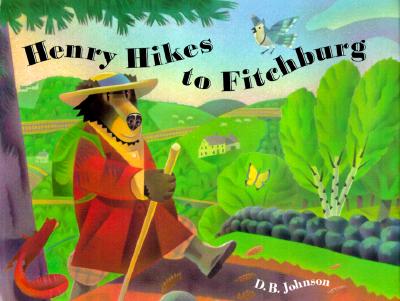In light of our Henry Hikes to Fitchburg discussion, I thought I’d share this happy find from another forum: The Blog of Henry David Thoreau. Hee!
From today’s entry (Thoreau’s Journal: 21-Mar-1856)—
I left home at ten and got back before twelve with two and three quarters pints of sap, in addition to the one and three quarters I found collected.
I put in saleratus and a little milk while boiling, the former to neutralize the acid, and the latter to collect the impurities in a skum. After boiling it till I burned it a little, and my small quantity would not flow when cool, but was as hard as half-done candy, I put it on again, and in a minute it was softened and turned to sugar.
While collecting sap, the little of yesterday’s lodging snow that was left, dropping from the high pines in Trillium Wood and striking the brittle twigs in its descent, makes me think that the squirrels are running there.
I noticed that my fingers were purpled, evidently from the sap on my auger.
Had a dispute with Father about the use of my making this sugar when I knew it could be done and might have bought sugar cheaper at Holden’s. He said it took me from my studies. I said I made it my study; I felt as if I had been to a university.
Related posts here and here.
She was reading Henry Hikes to Fitchburg, which I posted about the other day, and pointed out several connections:
• Thoreau is mentioned in the novel The Fledgling, by Jane Langton, which I have not read but Jane loved.
• As I noted in my review last week, among the neighbors for whom Henry’s friend does odd jobs are Mr. Hawthorne, Mrs. Alcott, and Mr. Emerson. I knew Jane would recognize the name “Alcott”—Little Women and Little Men are two of her favorite books— after reading the author’s note in the back of Henry Hikes, which briefly mentions Bronson Alcott (Louisa May’s father) and his unique ideas about education, Jane said, “Well, that explains Eight Cousins, doesn’t it?” Indeed, the heroine of this Louisa May Alcott novel comes to live with an uncle who has unorthodox (for his time) notions about how young girls should be raised and educated. “Simple clothes, plenty of fresh air and exercise, few parties, no fripperies, and lots of oatmeal,” Jane summarized. (“What are fwippawies?” Beanie wanted to know.)
• I was surprised the kids recognized Nathaniel Hawthorne’s name, but I forgot that Jim Weiss retells Hawthorne’s short story, “Dr. Heidegger’s Experiment,” on his Spooky Classics for Children collection.
• And finally—one might say: last and most certainly least—Jane tells me that she knows about Emerson “because Nancy Drew’s boyfriend, Ned Nickerson, went to Emerson College.” All righty, then. Certainly wouldn’t want to omit that important piece of information.
Henry Hikes to Fitchburg by D.B. Johnson.

One summer day, Henry and his friend decided to go to Fitchburg to see the country.
“I’ll walk,” said Henry. “It’s the fastest way to travel.”
“I’ll work,” Henry’s friend said, “until I have the money to buy a ticket to ride the train to Fitchburg. We’ll see who gets there first!”
So begins this charming tale based on a passage written by Henry David Thoreau. “One says to me,” Thoreau wrote, “‘I wonder that you do not lay up money; you love to travel; you might take the cars and go to Fitchburg today and see the country.’ But I am wiser than that. I have learned that the swiftest traveller is he that goes afoot.”
D.B. Johnson brings Thoreau’s message to life in the adventures of the amiable bear, Henry. While Henry’s friend works his tail off filling Mrs. Alcott’s woodbox (10 cents) and weeding Mr. Hawthorne’s garden (15 cents), Henry enjoys a long tramp across the countryside, pressing ferns, marveling at birds’ nests, and snacking on honey from a bee tree as he goes. His friend may earn the money that buys the fastest ride to Fitchburg, but Henry’s journey is the one that enriches the soul.
Lots to explore in this lovely book (including the identities of the neighbors who employ Henry’s friend at various odd jobs). We’ve had a soft spot for Thoreau around here every since Jane, as a tiny girl, adopted a pocket-sized copy of Walden. Enchanted by the novelty of a toddler-sized book full of important-looking, clearly-meant-for-grownups text, she carried that thing around until it was in tatters. At age three she would solemnly pretend to read it aloud: “New York City is a big house.” (I have no idea.) At age four, an eager reader, she puzzled her way through the bean-growing chapter and declared that Walden was her favorite book. That dog-eared little volume has long since disappeared, and her passion for Walden Pond dissipated the first time she entered Redwall Abbey, but our family fondness for Thoreau remains, and we were delighted to encounter him in the form of D. B. Johnson’s Henry the Bear.
Edited to add: there’s a follow-up to this post here.
For more recommendations, visit my Booknotes page.

